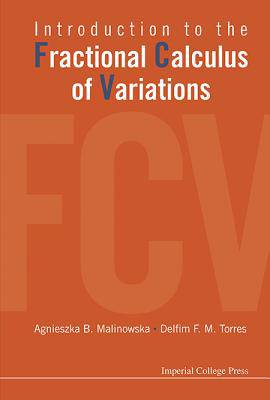
- Afhalen na 1 uur in een winkel met voorraad
- Gratis thuislevering in België vanaf € 30
- Ruim aanbod met 7 miljoen producten
- Afhalen na 1 uur in een winkel met voorraad
- Gratis thuislevering in België vanaf € 30
- Ruim aanbod met 7 miljoen producten
Zoeken
Introduction to the Fractional Calculus of Variations
Delfim F M Torres, Agnieszka Barbara Malinowska
Hardcover | Engels
€ 122,45
+ 244 punten
Omschrijving
This invaluable book provides a broad introduction to the fascinating and beautiful subject of Fractional Calculus of Variations (FCV). In 1996, FVC evolved in order to better describe non-conservative systems in mechanics. The inclusion of non-conservatism is extremely important from the point of view of applications. Forces that do not store energy are always present in real systems. They remove energy from the systems and, as a consequence, Noether's conservation laws cease to be valid. However, it is still possible to obtain the validity of Noether's principle using FCV. The new theory provides a more realistic approach to physics, allowing us to consider non-conservative systems in a natural way. The authors prove the necessary Euler-Lagrange conditions and corresponding Noether theorems for several types of fractional variational problems, with and without constraints, using Lagrangian and Hamiltonian formalisms. Sufficient optimality conditions are also obtained under convexity, and Leitmann's direct method is discussed within the framework of FCV.The book is self-contained and unified in presentation. It may be used as an advanced textbook by graduate students and ambitious undergraduates in mathematics and mechanics. It provides an opportunity for an introduction to FCV for experienced researchers. The explanations in the book are detailed, in order to capture the interest of the curious reader, and the book provides the necessary background material required to go further into the subject and explore the rich research literature.
Specificaties
Betrokkenen
- Auteur(s):
- Uitgeverij:
Inhoud
- Aantal bladzijden:
- 292
- Taal:
- Engels
Eigenschappen
- Productcode (EAN):
- 9781848169661
- Verschijningsdatum:
- 14/11/2012
- Uitvoering:
- Hardcover
- Formaat:
- Genaaid
- Afmetingen:
- 152 mm x 229 mm
- Gewicht:
- 566 g

Alleen bij Standaard Boekhandel
+ 244 punten op je klantenkaart van Standaard Boekhandel
Beoordelingen
We publiceren alleen reviews die voldoen aan de voorwaarden voor reviews. Bekijk onze voorwaarden voor reviews.











